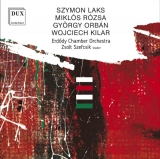 Szymon Laks: Sinfonietta; Miklos Rozsa: Konzert für Streichorchester; György Orban: Sopra canti diversi, Wojciech Kilar: Orawa; Erdödy Chamber Orchestra, Zsolt Szefcsik; 1 SACD Dux 1599; Aufnahme 06/2019, Veröffentlichung 01/2020 (64’13) – Rezension von Alain Steffen
Szymon Laks: Sinfonietta; Miklos Rozsa: Konzert für Streichorchester; György Orban: Sopra canti diversi, Wojciech Kilar: Orawa; Erdödy Chamber Orchestra, Zsolt Szefcsik; 1 SACD Dux 1599; Aufnahme 06/2019, Veröffentlichung 01/2020 (64’13) – Rezension von Alain Steffen
Mit Szymon Laks, Miklos Rozsa, György Orban und Wojciech Kilar präsentiert Dux vier Komponisten aus Osteuropa und mit ihnen Werke aus dem 20. und 21. Jahrhundert. Polen wird durch Laks (1901-1983) und Kilar (1932-2013), Ungarn durch den in Hollywood karrieremachenden Rozsa (1907-1995) und durch den in Rumänien geborenen György Orban (*1947) vertreten. Die Werke sind für Kammerorchester konzipiert und zeigen vier sehr unterschiedliche, aber durchaus attraktive Kompositionen, die etwas von dem Klischee abrücken, osteuropäische Musik sei hauptsächlich aufgebaut auf Volksmusik.
Die Sinfonietta von Laks entstand 1936, nimmt bereits die Grauen des Holocaust vorweg (der Komponist überlebte Ausschwitz und Dachau) und kommt in Sachen Intensität Shostakovich sehr nahe.
Mit Rozsas klassischer Musik habe ich meine Probleme, weil ihr die Überzeugungskraft und Intensität fehlt, die man sich eigentlich erwartet. So auch in seinem 1943 komponierten Concerto for String Orchestra, das für mich das schwächste Stück dieser CD ist. Interessant und hörenswert sind aber Sopra canti diversi von Orban und das minimalistische Orawa von Kilar. Das Erdödy Chamber Orchestra unter Zsolt Sfefcsik spielt recht gut. Das Klangbild kommt sowohl der Musik wie auch dem Orchester sehr entgegen.
With Szymon Laks, Miklos Rozsa, György Orban and Wojciech Kilar, Dux presents four composers from Eastern Europe and with them works from the 20th and 21st centuries. Poland is represented by Laks (1901-1983) and Kilar (1932-2013), Hungary by Rozsa (1907-1995), who made his career in Hollywood, and by Romanian-born György Orban (*1947). The works are conceived for chamber orchestra and show four very different, but very attractive compositions, which move away somewhat from the cliché that Eastern European music is mainly based on folk music.
The Sinfonietta by Laks was composed in 1936, already anticipates the horrors of the Holocaust (the composer survived Auschwitz and Dachau) and comes very close to Shostakovich in terms of intensity.
I have my problems with Rozsa’s classical music, because it lacks the persuasiveness and intensity one would expect. This is also the case with his Concerto for String Orchestra, composed in 1943, which for me is the weakest piece on this CD. But interesting and worth listening to are Sopra canti diversi by Orban and the minimalist Orawa by Kilar. The performances by the Erdödy Chamber Orchestra under Zsolt Sfefcsik are good. The recorded sound suits both the music and the orchestra very well.
























